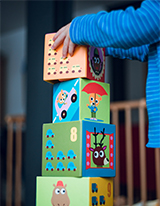Toys & Hobbies

The materials, decorations and toys you will use on special occasions organized for your children, or on important occasions that your children will attend, are among the factors that you can ensure their happiness. It is of great importance for your child to be satisfied with the atmosphere and to enjoy being in the organization. In this process, your child makes new friends and gets to know new people in the social environment and plays games with his peers. By playing, your children learn, develop and participate in social activities. Your children will want to spend time again and again with children's toys models that contain interesting and imaginative elements. Toys that will get more pleasure from playing each time make it easier for your child to get used to real life by providing life experience. You can take a look at the educational toys that attract attention with their colorful appearances and children's toys that your child will want to get engaged at every opportunity.
Toys & Hobbies For Fun, Education & Socialization
Toy is one of the most important factors in child development. A toy is any material that contributes to the mental, physical, and psycho-social development of children and develops children's imaginations and enables them to reveal their abilities at the same time. You can find toys that consist of a variety of materials, colors, and features on our Toys & Hobbies section.
How To Choose The Appropriate Toy
Although there are countless number of toy options you can let your children play with, not all of them are particularly helpful. While browsing the appropriate toys for your children, you need to be careful about how appropriate it is for your baby. Here are some points to consider. As a parent, you may have your own concerns and add to this list to create the most suitable one for your own family.
- It should be appropriate for the child's age.
- It should be capable of contributing to the different developmental characteristics of the child.
- The toy should have the ability to be used for different purposes in various games, also apprpriate for to multi-sensory learning.
- It should support the child's imagination while revealing the child's creativity.
- There should not be any kind of toys such as guns, rifles, knives, swords that could trigger the child's aggressive behavior.
- It should not be made of materials that would prevent the child from playing safely. (Glass, discolored, easily broken metal parts, etc.)
- It should be made of natural materials such as clay, water, sand and wood. Also, the paint on the toy should be water-based and non-toxic.
Toys Appropriate For Ages 2-3 (24-36 Months)
Children between the ages of 2-3 often begin to imitate the events around them. For this reason, childish-looking rag dolls, kitchen supplies, garden supplies, tool toys, transportation toys, wooden toys such as the materials that are formed and can be assembled by the child, doctor's tools are suitable for this age group.
Toys Appropriate For Ages 3-4 (36-48 Months)
Toys such as bicycles with 4 wheels, rocking horses, pedal cars can be preferred to support the motor development of children between the ages of 3-4. Along with these, puzzle toys, memory cards, blocks and cubes lined up from small to large, play dough variations are suitable toys for this age group.
Toys Appropriate For Ages 4-5
Children between the ages of 4-5 are in the socialization period. Therefore, house materials that can be played collectively, Legos, puzzle games, board games are suitable for this age group. In addition to these, games such as matching the parts can be preferred for the memory development of the child. Play dough variations improve the imagination and creative features of children in this age group.
Toys Appropriate For Ages 5+
After the age of 5, children can ride bicycles with support wheels, thereby improving their motor skills. Painting, cutting, pasting, creating something new with leftover materials, more than three piece riddles are suitable for this age group.
In addition, if your child has more toys than they need, you can box the toys evenly and change them every two weeks. Thus, the child will forget the removed toys and will perceive the newly arrived toys as the newly purchased. Also, set a toy shopping day with your child (such as once a month) and do not buy toys other than that. When buying a new toy, instill the awareness that he should give his old toys to someone who needs it. Thus, the number of toys is reduced and the feeling of sharing is acquired.
